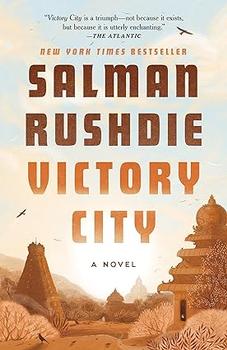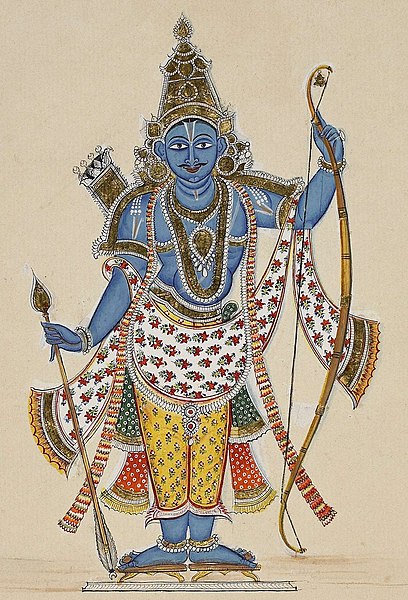Summary | Excerpt | Reviews | Beyond the book | Read-Alikes | Genres & Themes | Author Bio

A Novel
by Salman RushdieThe epic tale of a woman who breathes a fantastical empire into existence, only to be consumed by it over the centuries—from the transcendent imagination of Booker Prize–winning, internationally bestselling author Salman Rushdie.
In the wake of an unimportant battle between two long-forgotten kingdoms in fourteenth-century southern India, a nine-year-old girl has a divine encounter that will change the course of history. After witnessing the death of her mother, the grief-stricken Pampa Kampana becomes a vessel for a goddess, who begins to speak out of the girl's mouth. Granting her powers beyond Pampa Kampana's comprehension, the goddess tells her that she will be instrumental in the rise of a great city called Bisnaga—"victory city"—the wonder of the world.
Over the next 250 years, Pampa Kampana's life becomes deeply interwoven with Bisnaga's, from its literal sowing from a bag of magic seeds to its tragic ruination in the most human of ways: the hubris of those in power. Whispering Bisnaga and its citizens into existence, Pampa Kampana attempts to make good on the task that the goddess set for her: to give women equal agency in a patriarchal world. But all stories have a way of getting away from their creator, and Bisnaga is no exception. As years pass, rulers come and go, battles are won and lost, and allegiances shift, the very fabric of Bisnaga becomes an ever more complex tapestry—with Pampa Kampana at its center.
Brilliantly styled as a translation of an ancient epic, Victory City is a saga of love, adventure, and myth that is in itself a testament to the power of storytelling.
Rushdie's account of the history of Bisnaga is truly interesting and entertaining. Sometimes his strokes are too broad and his movement too plodding, but for the most part there are interesting characters, engaging dialogue and enough detail to flesh out the world without being overwhelming. And the novel works as a subtle satire of contemporary politics—especially in its observations about dictatorial leaders, and about religion as a tool of social control and oppression—but isn't overpowered by that reading. Despite Pampa's mission of equality, her writing and her actions aren't exactly feminist. This hypocrisy is, I imagine, an intentional part of Pampa's character. Her political imagination is limited—she's blessed with enough power and wisdom to play politics well in a patriarchal monarchy, but not enough to transform society into a feminist utopia, or even, it seems, to imagine what that might look like. Victory City reads often like a cynical satire of the liberal project. But some of Rushdie's other choices seem to transcend this winking hypocrisy and become gleefully misogynistic...continued
Full Review
 (1258 words)
(1258 words)
(Reviewed by Chloe Pfeiffer).
 The Ramayana, which translates from Sanskrit as "Rama's Journey," is one of the two great epic poems of India and a foundational text of Hinduism; the other is the Mahabharata, which is longer and means "Great Epic of the Bharata Dynasty." The Ramayana was composed by the poet Valmiki, probably around the 5th century BCE, though sources vary on this. The poem is split into seven parts; the first and last parts are believed to be later additions. Some of the Ramayana is thought to have taken place at or near the capital of the Vijayanagara Empire—the setting of Salman Rushdie's novel Victory City—and the empire's art and architecture were strongly inspired by the poem.
The Ramayana, which translates from Sanskrit as "Rama's Journey," is one of the two great epic poems of India and a foundational text of Hinduism; the other is the Mahabharata, which is longer and means "Great Epic of the Bharata Dynasty." The Ramayana was composed by the poet Valmiki, probably around the 5th century BCE, though sources vary on this. The poem is split into seven parts; the first and last parts are believed to be later additions. Some of the Ramayana is thought to have taken place at or near the capital of the Vijayanagara Empire—the setting of Salman Rushdie's novel Victory City—and the empire's art and architecture were strongly inspired by the poem.
The Ramayana tells the story of Rama, the son of a ...

If you liked Victory City, try these:

Madame Sosostris and the Festival for the Brokenhearted
by Ben Okri
Published 2025
In this modern fable with the impish magic of A Midsummer Night's Dream, a masked ball makes two upper-class British couples see each other in a new light.
A wise, enchanting novel about love, power, and our many selves—past and future, public and private—from the Booker Prize–winning author.

by Elizabeth Gonzalez James
Published 2025
A dazzling magical realism western in the vein of Cormac McCarthy meets Gabriel García Márquez, The Bullet Swallower follows a Mexican bandido as he sets off for Texas to save his family, only to encounter a mysterious figure who has come, finally, to collect a cosmic debt generations in the making.